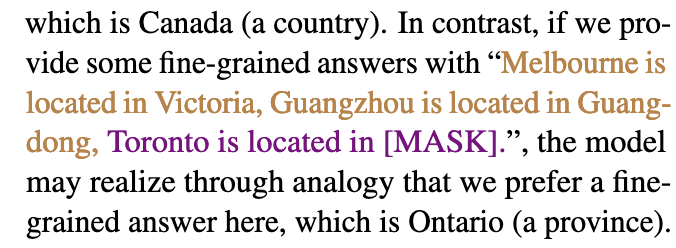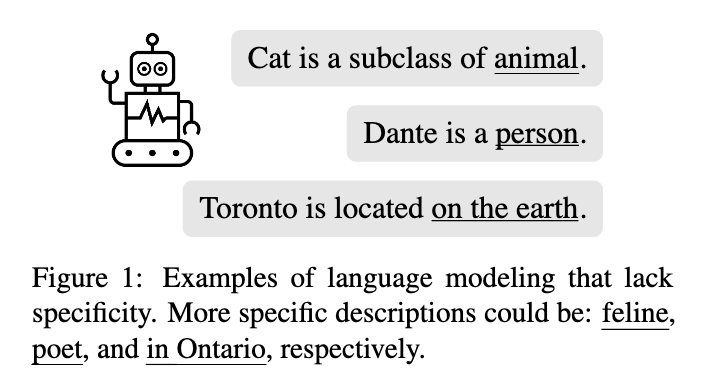[TOC]
- Title: Can Language Models Be Specific? How?
- Author: Jie Huang et. al.
- Publish Year: 11 Oct 2022
- Review Date: Tue, Nov 8, 2022
Summary of paper
Motivation
- they propose to measure how specific the language of pre-trained language models (PLM) is, To achieve this, they introduced a novel approach to build a benchmark for specificity testing by forming masked token prediction tasks with prompts.
- for instance given “J.K. Rowling was born in [MASK]”, we want to test whether a more specific answer will be better filled by PLMs. e.g., Yate instead of England
- it is known that if the prediction is more specific, we can retrieve more fine-grained information from language models, and further acquire more information.
- viewer’s opinion: we are not saying that summarisation is easy or having less useful information, there are cases that abstract info is more useful
Contribution
- although there are works on measuring how much knowledge is stored in PLMs or improving the correctness of the predictions, non attempted to measure or improve the specificity of prediction made by PLMs.
- Understanding how specific the language of PLMs is can help us better understand the behaviour of language models and facilitate downstream applications such as question answering etc.
- setup a dataset benchmark for specificity, The quality of the benchmark is high, where the judgment on which answer is more specific is ∼ 97% consistent with humans.
Discovery
- in general, PLMs prefer less specific answers without subjects given, and they only have a weak ability to differentiate coarse-grained/fine-grained objects by measuring their (cosine) similarities to subjects.
- the results indicate that specificity was neglected by existing research on language models
Improving specificity of the prediction
few-shot prompting
- where demonstrations with more specific answers are provided to guide the models to produce more specific answers

Cascade Prompting
- where “which” clauses are added as suffixes to bias the predictions to be more specific.

Terms
Specificity
- is a semantic feature of language to describe things specifically in a given context.
- or instance, to extract the answer (object) for relation (Toronto, location, X), we convert the query to a masked token prediction task using prompts, e.g., “Toronto is located in [MASK].” and let PLMs predict the masked token. The answer here can be a coarse-grained one, e.g., Canada, or a fine-grained one, e.g., Ontario.
Good things about the paper (one paragraph)
Major comments
Minor comments
Incomprehension
Potential future work
- the term “specificity” is related to the idea we mentioned before “the abstraction level of language information”
- this author, however, focus on how to increase the specificity of the PLM’s output.

